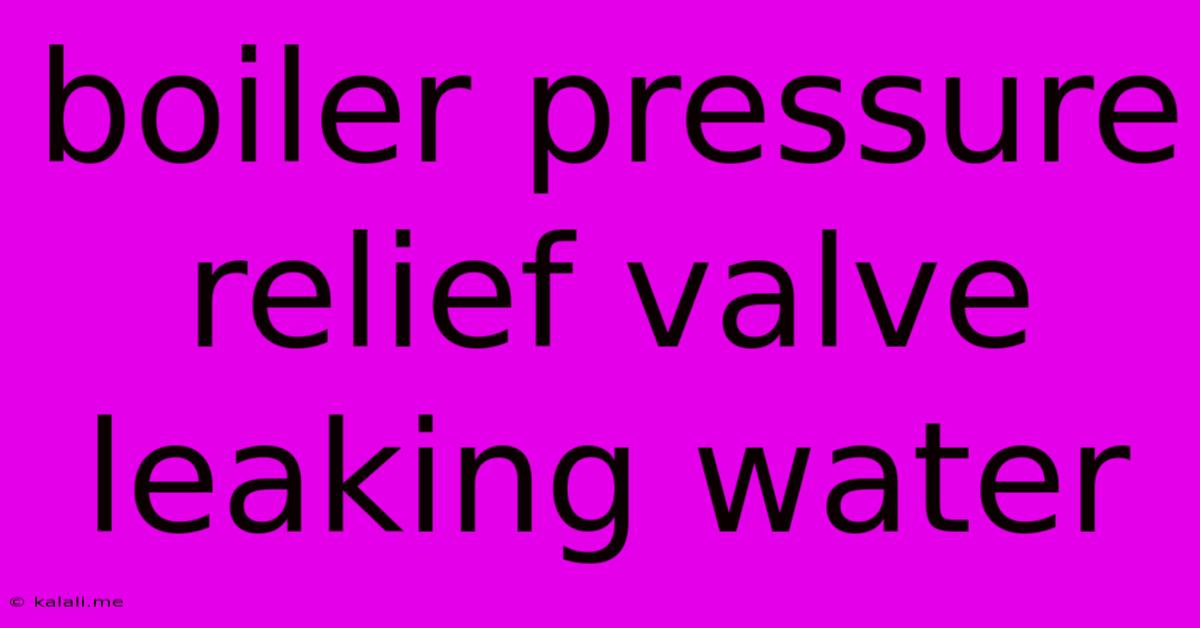Boiler Pressure Relief Valve Leaking Water
Kalali
Jun 01, 2025 · 4 min read

Table of Contents
Boiler Pressure Relief Valve Leaking Water: Causes and Solutions
A leaking boiler pressure relief valve is a serious issue that requires immediate attention. Ignoring a leak can lead to significant damage, potential safety hazards, and costly repairs. This article explores the common causes behind a leaking boiler pressure relief valve and offers practical solutions to address the problem. Understanding why your valve is leaking will help you determine the best course of action and prevent future issues.
What is a Pressure Relief Valve?
Before diving into the troubleshooting, it's crucial to understand the function of a pressure relief valve (PRV). This vital safety device is designed to automatically release excess pressure from your boiler system, preventing dangerous build-ups that could lead to explosions or serious damage. It's a critical component for the safe operation of any boiler system, whether it's a domestic hot water boiler or a larger industrial unit. When pressure exceeds a pre-set limit, the valve opens, releasing steam or water to relieve the pressure.
Why is My Boiler Pressure Relief Valve Leaking Water?
A leaking boiler pressure relief valve can stem from several issues. Here are some of the most common causes:
1. Excessive System Pressure:
- Cause: The most common reason is consistently high pressure within the boiler system. This can result from a malfunctioning pressure gauge, a faulty pressure-reducing valve, or simply overfilling the boiler. A water expansion tank issue can also contribute to increased pressure.
- Solution: Carefully inspect the pressure gauge for accuracy. If the gauge is faulty, replace it. Check the pressure-reducing valve to ensure it's functioning correctly. Finally, review and adjust the boiler's water level to the manufacturer's recommended level. Ensure your water expansion tank is correctly sized and functioning.
2. Worn-Out Valve Components:
- Cause: Over time, the valve's internal components, such as the seat and stem, can wear down due to repeated operation or corrosion. This wear can lead to leaks, even at normal operating pressures. Mineral deposits and hard water can also contribute to wear and tear.
- Solution: In this case, replacing the pressure relief valve is usually the most effective solution. It's vital to select a valve with the correct pressure rating for your boiler system.
3. Valve Scaling or Mineral Buildup:
- Cause: Hard water containing minerals can leave deposits on the valve's internal components. This buildup can restrict the valve's operation and cause leaks. This is particularly common in areas with hard water.
- Solution: A thorough cleaning of the valve might resolve the issue. However, significant scaling might necessitate valve replacement. Consider using a water softener to prevent future mineral buildup.
4. Damaged Valve Seal:
- Cause: The seal on the valve can become damaged or worn, leading to leakage. This can be due to age, corrosion, or physical damage.
- Solution: Repairing or replacing the valve seal might be possible. However, in many cases, replacing the entire valve is a more practical and effective solution.
5. Incorrect Valve Installation:
- Cause: Improper installation can lead to leaks and malfunctions. A poorly installed valve might not seal properly, leading to pressure loss.
- Solution: If you suspect improper installation, it's best to consult a qualified boiler technician to inspect and correct the installation.
When to Call a Professional:
While some minor issues might be addressed with simple maintenance, a persistent leak from the pressure relief valve requires professional attention. Don't attempt repairs beyond your skill level. Contact a qualified boiler technician immediately if:
- The leak is substantial.
- You're unsure about the cause of the leak.
- You're uncomfortable working with boiler systems.
Preventing Future Leaks:
Regular boiler maintenance is crucial to prevent future leaks and ensure safe operation. This includes:
- Regular Inspections: Regularly check the pressure gauge and visually inspect the pressure relief valve for any signs of leakage.
- Annual Servicing: Schedule an annual service by a qualified technician to check all boiler components, including the pressure relief valve.
- Water Treatment: Consider using a water softener to reduce mineral buildup and extend the life of your boiler components.
Addressing a leaking boiler pressure relief valve promptly is essential for both safety and the longevity of your boiler system. By understanding the potential causes and following the appropriate solutions, you can maintain a safe and efficient heating system. Remember, when in doubt, always consult a qualified professional.
Latest Posts
Latest Posts
-
Difference Between A Chorus And A Refrain
Jun 03, 2025
-
How Much In Box Of Powdered Sugar
Jun 03, 2025
-
Normalizing Flows To Infer The Likelihood
Jun 03, 2025
-
What Does God Say About Eating Meat
Jun 03, 2025
-
Do You Need To Season Stainless Steel Pans
Jun 03, 2025
Related Post
Thank you for visiting our website which covers about Boiler Pressure Relief Valve Leaking Water . We hope the information provided has been useful to you. Feel free to contact us if you have any questions or need further assistance. See you next time and don't miss to bookmark.